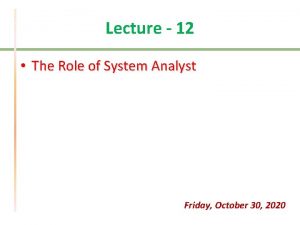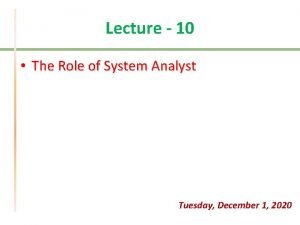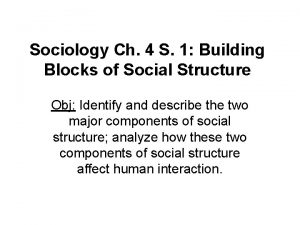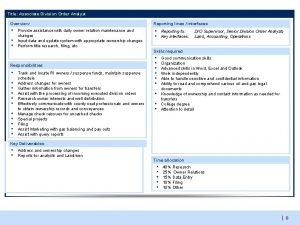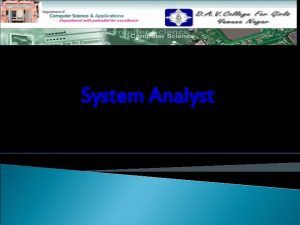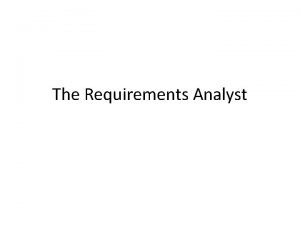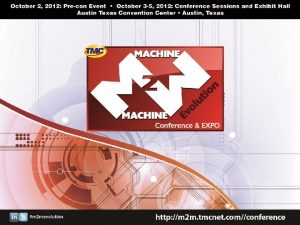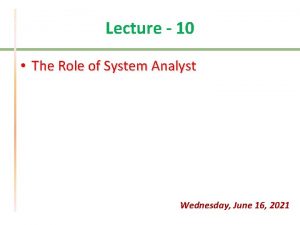Lecture 10 The Role of System Analyst Tuesday












- Slides: 12

Lecture - 10 • The Role of System Analyst Tuesday, December 1, 2020

Definition • System Analyst < < < Systems analysts are people who understand both business and computing. Systems analysts study business problems and opportunities and then transform business and information requirements of the business into the computer-based information systems and computer applications that are implemented by various technical specialists including computer programmers. A systems analyst facilitates the study of the problems and needs of a business to determine how the business system and information technology can best solve the problem and accomplish improvements for the business.

What Does a System Analyst Do? • System Analyst Posses Various Skill < Interpersonal Skill < Technical Skill

Interpersonal Skill • It deal with relationships and the interface of the analyst with people in business. • They are useful in establishing trust, resolving conflict and communicating information. • The interpersonal skills include: – Communication – Understanding – Teaching – Selling

Interpersonal Skill – Communication- • having the ability to articulate and speak the language of the user and • a knack for working with virtually all managerial levels in the organization. – Understandingüidentifying problems and assessing their ramifications having a grasp of company goals and objectives and üshowing sensitivity to the impact of the system on people at work.

Interpersonal Skill �Teaching�educating people in use of computer systems, selling the system to the user and �giving support when needed –Selling – • selling ideas and promoting innovations in problem solving using computers

Technical Skill • Technical skills focus on procedures and techniques for – operations analysis, – system analysis and – computer science.

Technical Skill • Technical skills include: – Creativity- • helping users model ideas into concrete plans and • developing candidate systems to match user requirements. – Problem solving- • reducing problems to their elemental levels for analysis, • developing alternative solutions to a given problem and • delineating the pros and cons of candidate systems.

Technical Skill – Project management • scheduling, • performing well under time constraints, • coordinating team efforts and • managing costs and expenditures. – Dynamic interface • blending technical and nontechnical considerations in functional specifications and general design

Interpersonal and Technical Skill During SDLC • System analysts require INTERPERSONAL as well as the TECHNICAL SKILLS, although the necessity for both skills depends on the stages of system development. • During analysis there is greater need for interpersonal skills - working with the user to determine requirements and translate them into design criteria. • During design, the major thrust is to develop a detailed design of the candidate system - highly technical procedures and methodologies. • During program construction, coding and testing are carried out with some user participation-technical skill.

Interpersonal and Technical Skill During SDLC • During system implementation, technical and interpersonal skills CONVERGE. – The technical aspects focus on “proving” the software and preparing for the final conversion of files and documentation. – The interpersonal aspects deal with user training and selling the user on the benefits and potential of the candidate system. • During the maintenance stage, the role of the analyst drops off, except when unanticipated problems develop.

Academic and Personal Qualification • Systems Analyst must have following qualifications: – Bachelors degree in an IT or engineer field – Must have a good understanding of IT architecture, IT systems, programming and development skills. • For a Business Analyst: – Bachelors degree in an IT or business field. A combination of the two is advantageous. – Some employers may require an MBA although this is not common place for Business Analysts and is normally associated more with Consultants. – Understanding of IT strategy applied to business, excellent communication skills must be obtained as a Business Analyst is often the interface between technical and business teams.
 Explain the multifaceted role of system analyst
Explain the multifaceted role of system analyst Role of system analyst
Role of system analyst 01:640:244 lecture notes - lecture 15: plat, idah, farad
01:640:244 lecture notes - lecture 15: plat, idah, farad Interpersonal skills of system analyst
Interpersonal skills of system analyst Technical skills of system analyst
Technical skills of system analyst Azure worker role
Azure worker role Role making role taking beispiele
Role making role taking beispiele Statuses and their related roles determine
Statuses and their related roles determine Emsi analyst
Emsi analyst Division order analyst
Division order analyst Business analyst skills and competencies
Business analyst skills and competencies Certified quality process analyst
Certified quality process analyst Megaputer intelligence
Megaputer intelligence
